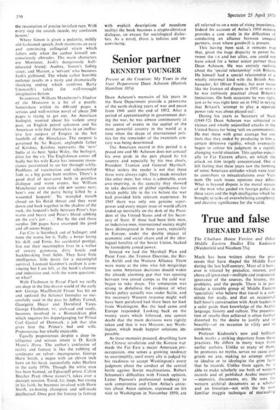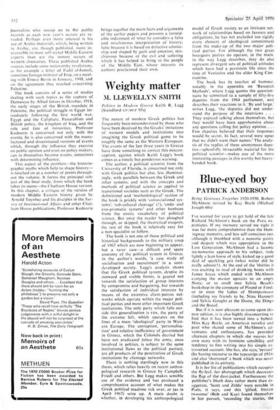True and false
BERNARD LEWIS
The Chatham House Version and Other Middle Eastern Studies Elie Kedourie (Weidenfeld and Nicolson 75s) Much has been written about the pro- cesses that have shaped the Middle East during the last half-century. Most of it hon•- .ever is vitiated by prejudice, interest, and above all ignorance—multiple and inspissated ignorance of the sources, the history, the problems, and the people. There is in par- ticular a sizeable group of Middle Eastern `specialists' who believe that travel is a sub- stitute for study, and that an occasional half-hour's conversation with Arab leaders is a safer guide than knowledge of the Arabic language, history and culture. The presenta- tion of results thus achieved is often further distorted by the desire to justify and to beautify—or on occasion to vilify and to condemn.
Profesor Kedourie's new and brilliant book marks• a striking departure from these practices. He differs in many ways from earlier authors. Unlike so many of them, he promotes no myths, serves no cause and grinds no axe, making no attempt either to idealise or to ideologise the grim facts that he records. Unlike them again, he is able to make scholarly use both of western records and of published Arabic materials —memoirs, documents, etc. He uses the western archival documents as a scholar and an historian—not with the by now familiar magpie technique of marauding
journalists who swoop on to the public records as each new year's secrets are re- vealed. Perhaps even more unusual is his use of Arabic materials, which, being written in Arabic, are, though published, more in- accessible to most self-styled Middle Eastern experts than are the inmost secrets of western chanceries. These published Arabic sources include some noteworthy revelations, as for example a letter of Fadil al-Jamali, sometime foreign minister of Iraq, on a meet- ing with Ernest Bevin in January, 1948, and on the agreement they reached concerning Palestine.
The book consists of a series of studies dealing with such topics as the capture of Damascus by Allied forces in October, 1918, the early stages of the British mandate in Palestine, the political struggle in Egypt im- mediately following the first world war, Egypt and the Caliphate, Panarabism and British policy, the kingdom of Iraq, and the role and fate of minorities. Professor Kedourie is concerned not only with the events; he is also concerned with the manu- factured and disseminated versions of events which, through the influence they exercise on public opinion and even on policy-makers, can in themselves become events, sometimes with determining influence.
This aspect of the problem—the historio- graphic myths which help to shape history— is touched on at a number of points through- out the volume. It forms the principal sub- ject of the final study, from which the book takes its name—the Chatham House version. In this chapter, a critique of the version of modern Middle Eastern history given by Arnold Toynbee and his disciples in the Sur- vey of International A flairs and other Chat- ham House publications, Professor Kedourie
brings together the main facts and arguments of the earlier papers and presents a formid- able indictment of what he considers a false and mischievous interpretation of history; false because it is based on defective scholar- ship and shaped by guilt and emotion; mis- chievous because of the evil and suffering which it has helped to bring to the people of the Middle East, whose interests its authors proclaimed their own.







































 Previous page
Previous page